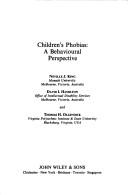| Listing 1 - 8 of 8 |
Sort by
|
Book
ISBN: 0809129701 Year: 1988 Publisher: New York : Paulist Press,
Abstract | Keywords | Export | Availability | Bookmark
 Loading...
Loading...Choose an application
- Reference Manager
- EndNote
- RefWorks (Direct export to RefWorks)
Attachment behavior. --- Identity (Psychology). --- Object relations (Psychoanalysis). --- Pastoral psychology. --- Spiritual healing.
Book
ISBN: 0471914916 9780471914914 Year: 1988 Publisher: Chichester Wiley
Abstract | Keywords | Export | Availability | Bookmark
 Loading...
Loading...Choose an application
- Reference Manager
- EndNote
- RefWorks (Direct export to RefWorks)
Primary groups --- Interpersonal relations --- Human relations --- Interpersonal relationships --- Personal relations --- Relations, Interpersonal --- Relationships, Interpersonal --- Social behavior --- Social psychology --- Object relations (Psychoanalysis)

ISBN: 0674041151 9780674041158 0674754115 9780674754119 Year: 1988 Publisher: Cambridge, Mass. : Harvard University Press,
Abstract | Keywords | Export | Availability | Bookmark
 Loading...
Loading...Choose an application
- Reference Manager
- EndNote
- RefWorks (Direct export to RefWorks)
There are more psychoanalytic theories today than anyone knows what to do with, and the heterogeneity and complexity of the entire body of psychoanalytic though have become staggering. In Relational Concepts in Psychoanalysis, Stephen A. Mitchell weaves strands from the principal relational-model traditions (interpersonal psychoanalysis, British school object-relations theories, self psychology, and existential psychoanalysis) into a comprehensive approach to many of the knottiest problems and controversies in theoretical and clinical psychoanalysis. Mitchell’s earlier book, Object Relations in Psychoanalytic Theory, co-authored with Jay Greenberg, set the stage for this current integration by providing a broad comparative analysis of important thinking on the nature of human relationships. In that classic study Greenberg and Mitchell distinguished between two basic paradigms: the drive model, in which relations with others are generated and shaped by the need for drive gratifications, and various relational models, in which relations themselves are taken as primary and irreducible. In Relational Concepts in Psychoanalysis, Mitchell argues that the drive model has since outlived its usefulness. The relational model, on the other hand, has been developed piecemeal by different authors who rarely acknowledge and explore the commonality of their assumptions or the rich complementarity of their perspectives. In this bold effort at integrative theorizing, Mitchell draws together major lines of relational-model traditions into a unified framework for psychoanalytic thought, more economical than the anachronistic drive model and more inclusive than any of the singular relational approaches to the core significance of sexuality, the impact of early experience, the relation of the past to the present, the interpenetration of illusion and actuality, the centrality of the will, the repetition of painful experience, the nature of analytic situation, and the process of analytic change. As such, his book will be required reading for psychoanalytic scholars, practitioners, candidates in psychoanalysis, and students in the field.
Psychoanalysis. --- Object relations (Psychoanalysis) --- Interpersonal relations. --- Motivation (Psychology) --- Object relations theory (Psychoanalysis) --- Psychoanalysis --- Interpersonal relations --- Psychology --- Psychology, Pathological --- Action, Psychology of --- Drive (Psychology) --- Psychology of action --- Human relations --- Interpersonal relationships --- Personal relations --- Relations, Interpersonal --- Relationships, Interpersonal --- Social behavior --- Social psychology --- Freud, Sigmund, --- Freud, Sigmund --- Motivation (Psychology). --- Object relations (Psychoanalysis). --- Psychoanalyse --- Psychoanalytic Theory. --- Psychoanalytic theory. --- Handboeken en inleidingen.

ISBN: 0803926065 Year: 1988 Publisher: London Sage
Abstract | Keywords | Export | Availability | Bookmark
 Loading...
Loading...Choose an application
- Reference Manager
- EndNote
- RefWorks (Direct export to RefWorks)
Primary groups --- Sociology of the family. Sociology of sexuality --- Sexology --- 392.6 --- #GBIB:IDGP --- Seksualiteit. Seksueel leven. Concubinaat. Samenwonen. Prostitutie. Erotiek. Seksuele gebruiken. Liefdeskunst --- 392.6 Seksualiteit. Seksueel leven. Concubinaat. Samenwonen. Prostitutie. Erotiek. Seksuele gebruiken. Liefdeskunst --- Interpersonal relations --- Intimacy (Psychology) --- Love --- Sex --- Gender (Sex) --- Human beings --- Human sexuality --- Sex (Gender) --- Sexual behavior --- Sexual practices --- Sexuality --- Affection --- Emotions --- First loves --- Friendship --- Human relations --- Interpersonal relationships --- Personal relations --- Relations, Interpersonal --- Relationships, Interpersonal --- Social behavior --- Social psychology --- Object relations (Psychoanalysis)

ISBN: 0394757300 0394551338 9780394757308 9780394551333 Year: 1988 Publisher: New York [N.Y.]: Pantheon books,
Abstract | Keywords | Export | Availability | Bookmark
 Loading...
Loading...Choose an application
- Reference Manager
- EndNote
- RefWorks (Direct export to RefWorks)
Why do people submit to authority and derive pleasure even others have over them? What is the appeal of domination and submission, and why are they so prevalent in erotic life? Why is it so difficult for men and women to meet as equals? Why, indeed, do they continue to recapitulate the positions of master and slave? In The Bonds of Love, noted feminist theorist and psychoanalyst Jessica Benjamin explains why we accept and perpetuate relationships of domination and submission. She reveals that domination is a complex psychological process which ensnares both parties in bonds of complicity, and shows how it underlies our family life, our social institutions, and especially our sexual relations, in spite of our conscious commitment to equality and freedom.
Depth psychology --- Freud, Sigmund --- Dominance (Psychology) --- Interpersonal relations --- Psychoanalysis --- Psychoanalysis and feminism --- Recognition (Psychology) --- Sex role --- Gender role --- Sex (Psychology) --- Sex differences (Psychology) --- Social role --- Gender expression --- Sexism --- Memory --- Feminism and psychoanalysis --- Feminism --- Psychology --- Psychology, Pathological --- Human relations --- Interpersonal relationships --- Personal relations --- Relations, Interpersonal --- Relationships, Interpersonal --- Social behavior --- Social psychology --- Object relations (Psychoanalysis) --- Social hierarchy (Psychology) --- Control (Psychology) --- Social groups --- Gender roles --- Gendered role --- Gendered roles --- Role, Gender --- Role, Gendered --- Role, Sex --- Roles, Gender --- Roles, Gendered --- Roles, Sex --- Sex roles --- Gender identity --- Psychoanalytic interpretation --- Sex differentiation --- Dominance-Subordination --- Gender Identity --- Psychoanalytic Interpretation --- Sex Differentiation --- Interpersonal Relations --- Gender --- Power --- Sado-masochism --- Oppression of women --- Book

ISBN: 0803929455 0803929447 9780803929456 9780803929449 Year: 1988 Volume: 8 Publisher: London: Sage publications,
Abstract | Keywords | Export | Availability | Bookmark
 Loading...
Loading...Choose an application
- Reference Manager
- EndNote
- RefWorks (Direct export to RefWorks)
Interpersonal relations --- Interpersonal communication --- Culture --- Intercultural communication --- Relations humaines --- Communication interpersonnelle --- Communication interculturelle --- 316.472.4 --- 316.454.5 --- 316.728 --- 316.77 --- #SBIB:309H021 --- Human relations --- Interpersonal relationships --- Personal relations --- Relations, Interpersonal --- Relationships, Interpersonal --- Social behavior --- Social psychology --- Object relations (Psychoanalysis) --- Communication --- Cross-cultural communication --- Cross-cultural orientation --- Cultural competence --- Multilingual communication --- Technical assistance --- Cultural sociology --- Sociology of culture --- Civilization --- Tussenmenselijke verhoudingen. Interpersoonlijke relaties --- Communicatie. Groepscommunicatie. Groepsinteractie --- Cultuur. Levenswijze --- Communicatiesociologie --- Intra- en interpersonele communicatie --- Anthropological aspects --- Social aspects --- Culture. --- Intercultural communication. --- Interpersonal communication. --- Interpersonal relations. --- 316.77 Communicatiesociologie --- 316.728 Cultuur. Levenswijze --- 316.454.5 Communicatie. Groepscommunicatie. Groepsinteractie --- 316.472.4 Tussenmenselijke verhoudingen. Interpersoonlijke relaties --- Popular culture

ISBN: 3525357397 Year: 1988 Publisher: Göttingen Vandenhoeck und Ruprecht
Abstract | Keywords | Export | Availability | Bookmark
 Loading...
Loading...Choose an application
- Reference Manager
- EndNote
- RefWorks (Direct export to RefWorks)
Middle class women --- -Middle classes --- -Interpersonal relations --- -Sex role --- -Middle class --- -Bourgeoisie --- Commons (Social order) --- Middle class --- Middle classes --- Social classes --- Gender role --- Sex (Psychology) --- Sex differences (Psychology) --- Social role --- Gender expression --- Sexism --- Human relations --- Interpersonal relationships --- Personal relations --- Relations, Interpersonal --- Relationships, Interpersonal --- Social behavior --- Social psychology --- Object relations (Psychoanalysis) --- Women --- History --- -Congresses --- Social conditions --- Europe --- Council of Europe countries --- Eastern Hemisphere --- Eurasia --- -Congresses. --- Interpersonal relations --- Sex role --- Congresses. --- -History --- Bourgeoisie --- History&delete& --- Congresses --- Gender roles --- Gendered role --- Gendered roles --- Role, Gender --- Role, Gendered --- Role, Sex --- Roles, Gender --- Roles, Gendered --- Roles, Sex --- Sex roles

ISBN: 0471102768 Year: 1988 Publisher: Chichester New York Toronto Wiley
Abstract | Keywords | Export | Availability | Bookmark
 Loading...
Loading...Choose an application
- Reference Manager
- EndNote
- RefWorks (Direct export to RefWorks)
Behavior therapy --- Behavioral therapy --- Comportement [Thérapie de ] --- Fobieën bij kinderen --- Gedragstherapie --- Phobias in children --- Phobies chez l'enfant --- Therapie [Gedrags] --- Thérapie comportementale --- Thérapie de comportement --- Child. --- Behavior Therapy. --- Phobic Disorders. --- Child development --- Early childhood education --- -Early childhood education --- -Interpersonal relations --- -Human relations --- Interpersonal relationships --- Personal relations --- Relations, Interpersonal --- Relationships, Interpersonal --- Social behavior --- Social psychology --- Object relations (Psychoanalysis) --- Education --- Child study --- Children --- Development, Child --- Developmental biology --- Developmental psychobiology --- Child rearing --- Claustrophobia --- Neuroses, Phobic --- Phobia, School --- Phobia, Social --- Phobias --- Phobic Neuroses --- Claustrophobias --- Disorder, Phobic --- Disorders, Phobic --- Phobia --- Phobias, School --- Phobias, Social --- Phobic Disorder --- School Phobia --- School Phobias --- Social Phobia --- Social Phobias --- Fear --- Therapy, Behavior --- Therapy, Conditioning --- Behavior Modification --- Conditioning Therapy --- Behavior Modifications --- Behavior Therapies --- Conditioning Therapies --- Modification, Behavior --- Modifications, Behavior --- Therapies, Behavior --- Therapies, Conditioning --- Mind-Body Therapies --- Behavior Control --- Minors --- Activity programs --- Parent participation --- Study and teaching (Early education) --- Development --- -Activity programs --- -Child study --- Human relations --- Behavior Therapy --- Child --- Phobic Disorders --- Child psychopathology --- Fear in children --- Behavior modification --- Psychotherapy --- Phobias in children. --- Behavior therapy. --- Behavior Treatment --- Treatment, Behavior --- Behavior Change Techniques --- Behavior Change Technique --- Technique, Behavior Change --- Scolionophobia
| Listing 1 - 8 of 8 |
Sort by
|

 Search
Search Feedback
Feedback About UniCat
About UniCat  Help
Help News
News